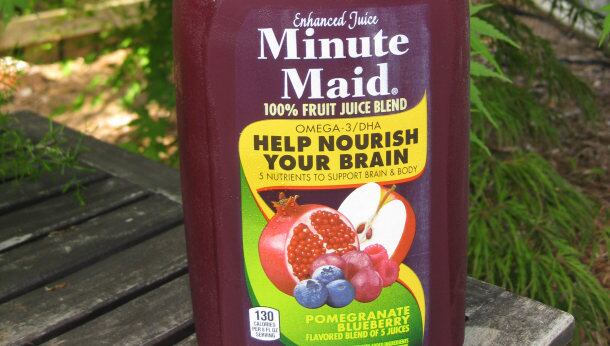As many food law attorneys predicted after Coca-Cola’s grilling by Supreme Court justices in April, the nation’s highest court rejected Coke’s arguments that federal labeling regulations trump a Lanham Act claim over false advertising and concluded that POM can sue over allegations that Coke misled consumers with its Minute Maid pomegranate blueberry juice labels.
The justices have been looking at a false advertising suit filed by POM under the Lanham Act accusing Coke of “willfully misleading consumers” by marketing a juice comprised almost entirely of apple & grape juice as ‘Pomegranate Blueberry' (Coke says it complies with federal juice labeling laws, which trump Lanham Act claims). Click HERE for details.
It will not be enough just to comply with the letter of the law
David L. Ter Molen, a partner in the Chicago offices of law firm Freeborn & Peters LLP, told FoodNavigator-USA: “It wasn’t surprising that they ruled in favor of POM, given what we heard in [oral arguments] in April, but the fact that there wasn’t even any real hedging was a surprise.”
Many observers had predicted that the justices would look for some middle ground, ruling that competitors can bring false advertising claims over apparently FDA compliant labels under the Lanham Act in some circumstances, but that this particular case - a juice name specifically authorized by federal legislation governing juice naming and labeling - is not actionable, he said.
However, they shot down this argument, said Ter Molen.
In other words, just because you’ve complied with the letter of the law doesn’t mean you’re safe, which was quite worrying for food marketers and their regulatory affairs colleagues, he said.
Ivan Wasserman, partner at Manatt Phelps & Phillips in Washington DC, told FoodNavigator-USA: “I will be reviewing the opinion carefully but it appears that we are now clearly in a world in which ensuring a product label complies with FDA labeling regulations is just the start of the analysis.”
The industry is subject to endless litigation in which almost every ingredient
Indeed, while the CSPI described the opinion as a "clear and unequivocal victory for consumers as well as competitors", many regulatory affairs managers at food and beverage companies will be sleeping less soundly after reading it, added Ronald J. Levine, co-chair in the litigation department at Herrick, Feinstein LLP in New York.
"The Supreme Court unfortunately did not seize this opportunity to strengthen a uniform system of food labeling. At the moment the industry is subject to endless litigation in which almost every ingredient, or description on a label, can be the subject of second guessing in consumer fraud class actions.
"The solution will only come from the Courts or the federal government. Hopefully the industry will continue to have greater success in tightening up the standards for certifying class actions."

A significant victory for POM and a defeat for Coke, FDA and, potentially, uniformity and certainty principles re food labeling

Dale Giali, partner in the LA office of law firm Mayer Brown, told FoodNavigator-USA that the opinion amounted to a "significant victory for POM and a defeat for Coke, FDA and, potentially, uniformity and certainty principles re food labeling”.
That said, as consumers cannot bring lawsuits under the Lanham Act, he said, it didn’t necessarily have significant implications for consumer class action lawsuits over false advertising.
“The court is quite careful to limit this to federal v. federal law and competitor suits, and to make clear that this is not a question of state v. federal law or consumer suits.
“Of course, the onslaught of consumer class actions are almost exclusively brought under state law, so we believe that preemption principles (to the extent they applied previously) will continue to apply in the same manner following POM v. Coke.
“But, we expect the plaintiffs’ bar to argue (when convenient for them) that POM v. Coke means the FDCA [federal Food, Drug & Cosmetic Act] is not the final word on false advertising re food labels."
Justice Kennedy: Competitors may bring Lanham Act claims like POM’s that challenge food and beverage labels regulated by the FDCA
Justice Kennedy delivered the opinion of the Court, noting that: “The ruling that POM’s Lanham Act cause of action is precluded by the FDCA was incorrect.
“There is no statutory text or established interpretive principle to support the contention that the FDCA precludes Lanham Act suits like the one brought by POM in this case. Nothing in the text, history, or structure of the FDCA or the Lanham Act shows the congressional purpose or design to forbid these suits.
“Quite to the contrary, the FDCA and the Lanham Act complement each other in the federal regulation of misleading food and beverage labels. Competitors, in their own interest, may bring Lanham Act claims like POM’s that challenge food and beverage labels that are regulated by the FDCA.”
Daniel Silverman, former in-house counsel at POM Wonderful and Partner at Venable LLP in Los Angeles, said: “This decision shows that competitors can be successful at challenging their rivals and we can expect more vigorous litigation between competitors, as well as more class actions arising from consumer product labeling issues.”
More reaction to follow…
Click HERE to read the opinion from the Supreme Court.
